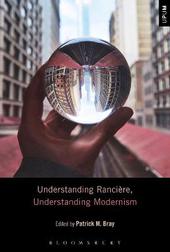
|
Understanding Ranciere, Understanding Modernism
Hardback
Main Details
Description
The contemporary philosopher Jacques Ranciere has become over the last two decades one of the most influential voices in philosophy, political theory, and literary, art historical, and film criticism. His work reexamines the divisions that have defined our understanding of modernity, such as art and politics, representation and abstraction, and literature and philosophy. Working across these divisions, he engages the historical roots of modernism at the end of the eighteenth century, uncovering forgotten texts in the archive that trouble our notions of intellectual history. The contributors to Understanding Ranciere, Understanding Modernism engage with the multiplicity of Ranciere's thought through close readings of his texts, through comparative readings with other philosophers, and through an engagement with modernist works of art and literature. The final section of the volume includes an extended glossary of the most important terms used by Ranciere, which will be a valuable resource for experts and students alike.
Author Biography
Patrick M. Bray is Associate Professor of French at the Ohio State University, USA. He is the author of The Novel Map: Space and Subjectivity in Nineteenth-Century French Fiction (2013) and co-editor of Building the Louvre: Architectures of Politics and Art (2014).
ReviewsPatrick Bray's collection Understanding Ranciere, Understanding Modernism brings together some of the foremost scholars engaging with the work of Jacques Ranciere today. What is perhaps most notable about it, however, is that reading it is akin to finding oneself in the 'unpredictable' library that Ranciere laments the loss of in the volume's concluding interview. If the old Bibliotheque Nationale's 'heterogeneous books...grouped together side by side,' enabled Ranciere to write as he does, crossing disciplinary borders and thinking around singular problems in the mode of discovery rather than mastery, the volume's approach to Ranciere operates on a similar principal (p. 277). Allowing the reader unfamiliar with Ranciere's work to find footholds in the definitions of key concepts found in the volume's third section, the collection also offers unexpected new directions. * H-France * Bray's collection - and Bloomsbury's series, generally - provides a wealth of intriguing new theoretical possibilities. * French Studies * In addition to highlighting the range and influence of Ranciere's work, these essays confirm the rigour, richness, and robust critical independence of the responses this work is now inspiring. As a result, this collection not only offers a compelling account of current work around Ranciere: it relaunches this work anew. * Martin Crowley, Reader in Modern French Thought and Culture, University of Cambridge, UK * Deviating wisely down the byways of Ranciere's writing by attending closely to the textual and conceptual singularity of a significant constellation of hitherto less extensively debated works, this collection does indeed provide invaluable new understanding of his unfailingly productive struggle with modernism. The volume is suffused with that acutely responsive sensitivity to the shifting displacements of his unclassifiable project which Ranciere speaks of in the substantial and wide-ranging closing interview. * Oliver Davis, Reader in French Studies, University of Warwick, UK * A cornucopia of some of the best critical minds working in French theory today. It contains a challenging yet highly accessible collection of essays that illuminate the importance of one of the most important theorists of today. Patrick M. Bray has done a masterful job in editing a collection that will have a long shelf life. * Lawrence D. Kritzman, John D. Willard Prof of French and Comparative Literature, Dartmouth College, USA *
|